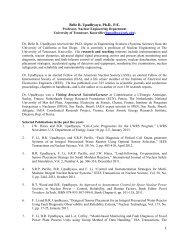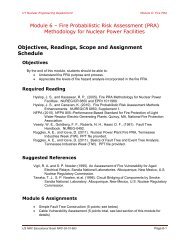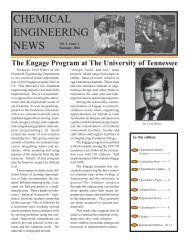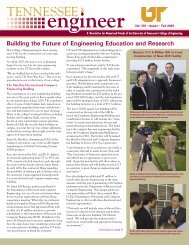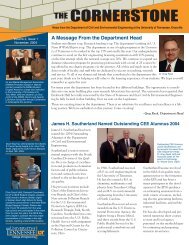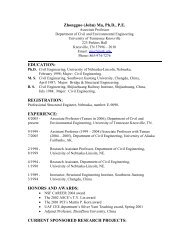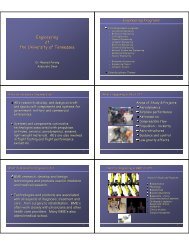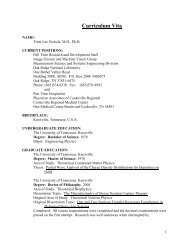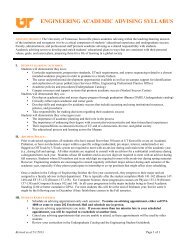Student Guidebook 2013 (PDF) - College of Engineering - The ...
Student Guidebook 2013 (PDF) - College of Engineering - The ...
Student Guidebook 2013 (PDF) - College of Engineering - The ...
You also want an ePaper? Increase the reach of your titles
YUMPU automatically turns print PDFs into web optimized ePapers that Google loves.
Career Information<br />
What can I do with this engineering major?<br />
Electrical <strong>Engineering</strong><br />
http://www.eecs.utk.edu/<br />
What is Electrical <strong>Engineering</strong>?<br />
Electrical engineering deals with<br />
the application <strong>of</strong> the physical laws governing charged<br />
particles. From miniature integrated circuits that contain<br />
millions <strong>of</strong> microelectronic devices, to high-speed fiber-optic<br />
communication systems that span international boundaries,<br />
electrical engineering impacts every aspect <strong>of</strong> modern-day<br />
living. Electrical engineering is unique among the engineering<br />
disciplines because <strong>of</strong> its wide range <strong>of</strong> applications. Subject<br />
areas within electrical engineering are so diverse that it is not<br />
always apparent that there is an underlying connection. <strong>The</strong><br />
range <strong>of</strong> subjects is not only broad but is also expanding.<br />
<strong>The</strong> program educational objectives <strong>of</strong> the electrical<br />
engineering program include:<br />
<br />
engineering, science and mathematics in the practice<br />
<strong>of</strong> electrical/computer engineering or in advanced<br />
pr<strong>of</strong>essional studies; will identify, formulate and solve<br />
electrical/computer engineering problems.<br />
<br />
containing hardware and s<strong>of</strong>tware components with<br />
consideration <strong>of</strong> economic, ethical, safety, environmental,<br />
and social issues; will be able to use modern engineering<br />
techniques, skills and tools.<br />
<br />
teams, and engage in lifelong learning.<br />
<strong>The</strong> university’s engineering programs are fully accredited by<br />
the ABET <strong>Engineering</strong> Accreditation Program.<br />
Career Opportunities in Electrical <strong>Engineering</strong><br />
<strong>The</strong> growth trends for employment <strong>of</strong> electrical engineering<br />
graduates are expected to increase through 2015.<br />
Projected job growth stems largely from increased demand<br />
for electrical and electronic goods, including advanced<br />
communications equipment, computer communications,<br />
biomedical instrumentation, defense-related electronic<br />
equipment, and consumer electronics products. <strong>The</strong> need for<br />
electronics manufacturers to invest heavily in research and<br />
development to remain competitive and gain a scientific edge<br />
will provide openings for graduates who have learned the<br />
latest technologies.<br />
Industrial <strong>Engineering</strong><br />
http://www.engr.utk.edu/ie/<br />
What is Industrial <strong>Engineering</strong>?<br />
Originally, the industrial<br />
engineering pr<strong>of</strong>ession focused<br />
on manufacturing. Today’s industrial engineer is involved<br />
in the design <strong>of</strong> systems and processes to produce and<br />
deliver goods and services not only in manufacturing, but<br />
also in the service industries and government sectors <strong>of</strong> the<br />
economy. Industrial engineers are concerned with the design<br />
<strong>of</strong> integrated systems involving people, materials, facilities,<br />
finances, equipment, and energy to ensure the overall system<br />
functions efficiently and human needs are adequately met.<br />
Industrial engineering is distinctive in two respects: <strong>The</strong><br />
industrial engineer typically works on problems or systems<br />
which include human beings as a major variable; and the<br />
industrial engineer is by definition a systems engineer, whose<br />
unique combination <strong>of</strong> skills can be applied to many working<br />
environments.<br />
It is this emphasis on people, science and technology<br />
that distinguishes industrial engineering from the other<br />
engineering disciplines. <strong>The</strong> industrial engineer’s objective<br />
is to achieve the best possible results for the benefit <strong>of</strong><br />
humankind, in terms <strong>of</strong> safety, quality and productivity.<br />
Industrial engineers create value through a total systems<br />
approach, scientific method, engineering design, and<br />
integration <strong>of</strong> new technologies. In common with all<br />
engineering disciplines, industrial engineering is based on<br />
mathematics and the physical sciences. However, industrial<br />
engineering also emphasizes the life sciences and social<br />
sciences. This concern for the human element leads to system<br />
designs that enhance the quality <strong>of</strong> life for all people, both as<br />
20<br />
producers and consumers <strong>of</strong> products and services.<br />
<strong>Student</strong>s in the Industrial <strong>Engineering</strong> program can also<br />
gain hands-on experience and forge beneficial relationships<br />
with industry, business, and agencies through the <strong>College</strong>’s<br />
cooperative engineering program or internships. <strong>The</strong><br />
department’s faculty is also very active in research and <strong>of</strong>fers<br />
opportunities for students to get involved including working<br />
with various research centers on campus.<br />
<strong>The</strong> educational objectives <strong>of</strong> the Industrial <strong>Engineering</strong><br />
Program are to prepare our students to:<br />
<br />
and systems engineering concepts and principles,<br />
<br />
<br />
<strong>The</strong> university’s engineering programs are fully accredited by<br />
the ABET <strong>Engineering</strong> Accreditation Program.<br />
Career Opportunities in Industrial <strong>Engineering</strong><br />
Industrial engineers have an almost unlimited range <strong>of</strong><br />
career fields available, including retail distribution, banking,<br />
health-care delivery, corporate management, consulting<br />
firms, aerospace systems, research groups, government and<br />
military agencies as well as manufacturing. In all areas <strong>of</strong><br />
manufacturing, service and government, there is increasing<br />
emphasis on the goal <strong>of</strong> improving quality and productivity.<br />
Industrial engineers work closely with the top management<br />
in these sectors to achieve this goal. IE’s command very<br />
competitive salaries in a strong market that is expected to<br />
<br />
growth <strong>of</strong> the fifteen engineering disciplines. IE’s also rank<br />
very high in job satisfaction surveys.



